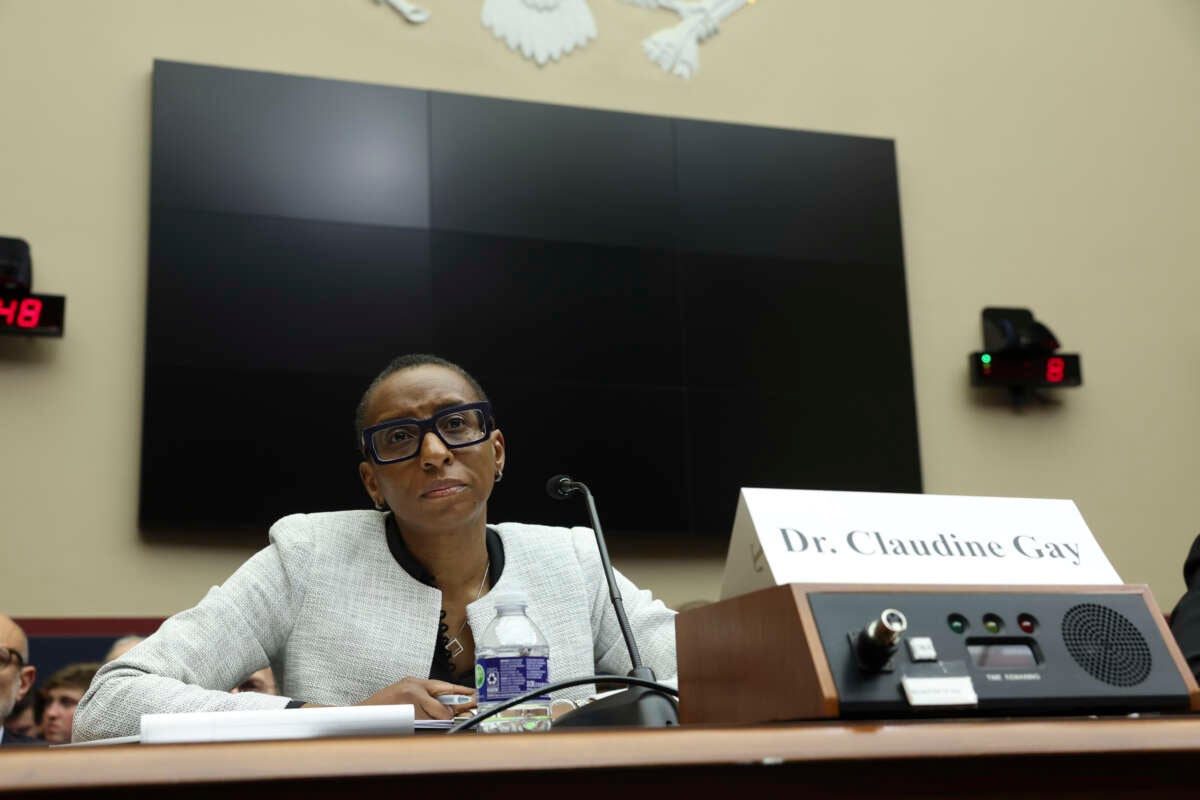"As a Black woman, I am furious for her — for the way she was made a victim of racist vitriol and bullying.
But as a supporter of Palestinian liberation, I am furious at her..."
Claudine Gay Faced Racism and Zionist Ire — She Also Failed Palestinian Students
Racism is built into Harvard’s foundation. As president, Gay was both a victim and an agent of white supremacy.

On January 2, 2024, Claudine Gay became the shortest-serving president of Harvard University. What could have been a presidential tenure of transformative actions befitting of the hopeful promises of Harvard’s first Black woman president has instead ended in frustration and controversy. I watched and experienced her tumultuous six-month tenure as a Black woman alumna. As we begin to decide how we want to remember her presidency, one glaringly obvious truth persists: Harvard will always protect white supremacy. In suppressing pro-Palestine students, President Gay was doing the job of a Harvard president and carrying out the University’s commitment to white supremacy. But ultimately, when she failed to do this well enough, she became a victim of the same racism she had tried to uphold. The interdependency of anti-Black racism and Zionism cannot be more clear than through President Gay’s tenure and resignation.
As a Black woman who has ascended through the ranks of some of academia’s most lauded institutions, President Gay is not a stranger to racist, misogynistic abuse from critics and colleagues. She would have become used to demonstrating the extent of her qualifications, aptitude, and credibility far beyond what was expected of her white counterparts. In a world that works tirelessly to undermine Black women, it is no surprise that the first one appointed to lead an institution built on and funded by white supremacy would be the victim of racist attacks.
The accusations of plagiarism levied against President Gay cannot be separated from her identity as a Black woman. They did not come from scholars with an earnest commitment to academic integrity but from political opponents intent on scrutinizing her entire career and leadership. Bill Ackman saw her appointment as a prime opportunity to accelerate his right-wing vision for Harvard. His attacks against her made obvious use of anti-Blackness and were folded into a broader anti-DEI campaign that highlights his commitment to preserving Harvard’s whiteness. Ackman’s thinly-masked racist attacks have attempted to undermine Gay as a person and qualified professional. Labeling her a diversity hire implies she lacks the skills and experience to serve as a university president; amplifying initial allegations of plagiarism provides him “evidence” to support his racist claim.
While plagiarism should be treated seriously and dealt with fairly, the rhetoric around the allegations and investigation against President Gay’s reduce her to a villian and make clear that they are the final stage of a sustained and calculated campaign. Finding a seemingly legitimate reason to attack a Black woman is a grossly familiar tactic used to discredit our voices and expertise and preserve white supremacy.
Related Story:
Harvard Has Become a Tax Shelter for Billionaires as Public Education Languishes
As a Black woman, I am furious for her — for the way she was made a victim of racist vitriol and bullying.
But as a supporter of Palestinian liberation, I am furious at her.
President Gay repeatedly failed to listen to and protect Palestinian and pro-Palestinian students on campus. Her administration failed to unequivocally condemn the targeted harassment and doxxing of students, many of whom are Palestinian, Black, Arab, South Asian, Muslim, undocumented, and/or international. The task force established to address the doxxing operated with limited personnel, resources, and mandate; when harassment persisted, President Gay claimed that the university had “done enough” and she was “satisfied” with their response. After severe intimidation, death threats, and hateful encounters on campus, the Palestine Solidarity Committee demanded “a committee to investigate anti-Palestinian racism and suppression of pro-Palestine voices.” This demand — and the repeated requests for Palestinians and the committee to meet with the President — were met with no response. But just a day afterward, President Gay attended a Shabbat dinner at Harvard Hillel and announced the Antisemitism Advisory Group, providing institutional support, resources, personnel, and legitimacy to address antisemitism on Harvard’s campus.
President Gay failed to acknowledge that the safety of Jewish students is inextricably linked to the safety of Palestinian and other students. In repeatedly ignoring Palestinian and anti-Zionist Jewish voices, she made it clear that Harvard was unwilling to commit to ending all forms of racism — and that she would play an active role in upholding the university’s commitment to white supremacy. Furthermore, in failing to respond to meeting requests from anti-Zionist Jewish students, President Gay made it clear that she was not committed to protecting all Jewish students; her commitment was to protect Zionists.
But Zionists demanded that she do more. It was not enough that she failed to respond to and protect pro-Palestinian students; she also needed to make actively suppressing pro-Palestinian voices a defining mark of her tenure. President Gay condemned the slogan “from the river to the sea” and oversaw the initiation of disciplinary action against student activists. For me, the most painful evidence of this has been the eviction of former first-year proctor Elom Tettey-Tamaklo after he peacefully confronted and de-escalated an attempt to compromise the safety of protesters at a die-in at the Harvard Business School.
How can we reflect on the selection of Harvard’s first Black president as a victory if such an appointment did not result in a safer and more just campus for Black students and staff? Why should we celebrate representation when our community members who come to hold such platforms of authority — that have historically been denied to us — fail to use them to uplift the voices of other marginalized people?
Since October 7, most campus activists and alumni who support them have not called for her resignation. Rather, students and alumni implored President Gay to defend pro-Palestinian voices on campus and stand in solidarity with Palestinians in Gaza, the West Bank, and around the world. Personally, I hoped that she might see herself and her son in the mothers of Gaza, just as she saw herself in the mothers of George Floyd and Ahmaud Arbery, and act with empathy and a commitment to justice. I was ready to celebrate President Gay if she placed herself on the right side of history and took the first steps towards ending Harvard’s complicity in maintaining Israeli apartheid.
Let me be clear: President Gay was forced out not because she is antisemitic and/or anti-Zionist but because she is not Zionist enough. The Congressional hearing on December 5 was little more than political theater in which right-wing leaders created and seized an opportunity to undermine core tenets of liberal arts institutions and divert attention from the genocide in Gaza. The hearing was never going to be a meaningful intervention to address the real and harmful threat of antisemitism or a forum for President Gay to redeem herself in the eyes of right-wing provocateurs. Rather, she was accused of providing unsatisfying answers to questions about a course on settler colonialism in Palestine and made to state her belief in Israel’s right to exist. Furthermore, the country watched as President Gay — the lone Black woman on the panel — was interrupted and belittled more than the others in a routine display of misogynoir.
In reading her resignation letter, it horrifies me that she has faced racist threats to her safety. But it does not surprise me. It should not surprise any of us that the same people who refuse to call for a ceasefire in Gaza and who support the genocide of Palestinians are the same people who would threaten the safety of a Black woman. All of these actions are motivated by racism. Zionism, just like anti-Black racism, is a product of white supremacy. They motivate and reinforce each other.
Many Palestinian, Black, Arab, South Asian, Muslim, and otherwise marginalized students and alumni deeply wanted President Gay to be different. I would have hoped that she — as a Black woman descended from anti-imperial revolutionaries who has built her career on scholarship about minority politics and Black American political behavior — might challenge Harvard’s commitments to white supremacy. I hoped that she would take historic steps towards aligning the office of the President with social justice movements deeply similar to and intertwined with her personal history and professional interests. But I knew that no matter her personal convictions, she would center the interests of donors just as the office of the president requires. And I knew that no matter her actions, she would receive racist and sexist hate every step of the way.
I had hopes of a transformative tenure that would match and meaningfully surpass the significance of her appointment as the first Black woman president of Harvard. But rather than ally with those ready to ally with her and call out instances of misogynoir against her, President Gay chose to ally herself with traditional axes of power: with Zionists and racists who would pave the way for her resignation.
Harvard will continue to be an institution that protects and relies on white supremacy. President Gay attempted to appease its most powerful professors, donors, and alumni by participating in white supremacy herself — silencing pro-Palestinian voices and failing to protect marginalized students. She was rewarded with the gifts white supremacy bestows on Black women who do not conform well enough: undermining her expertise, villainizing her character, threatening her safety, and eventually discarding her wholesale.
Her presidency makes clear that there will always be limits to representation at institutions deeply embedded in white supremacy. These appointments do not suddenly make us acceptable to racists, nor can these institutions offer us protection from themselves.
The liberation of Black women is impossible without the liberation of Palestine. Black women deserve far better than to be victims of witch hunts and puppets of white supremacist projects, and the Palestinian people deserve unwavering, unequivocal, and explicit solidarity from every marginalized person who is given a powerful platform. We should mourn President Gay’s tenure because she was both a victim and an agent of white supremacy. We should be disappointed because we wanted both better for her and from her.
ABOUT THE AUTHOR:
Aaryan Morrison is a South African-American from Indiana. She is a graduate of Harvard College and a current master’s student at the University of Oxford.


























